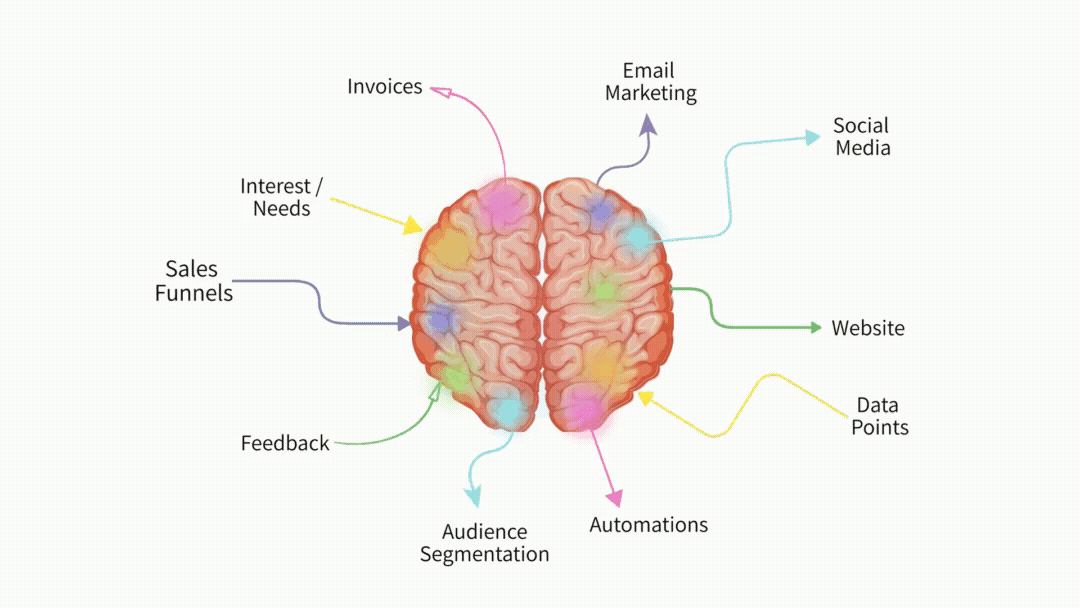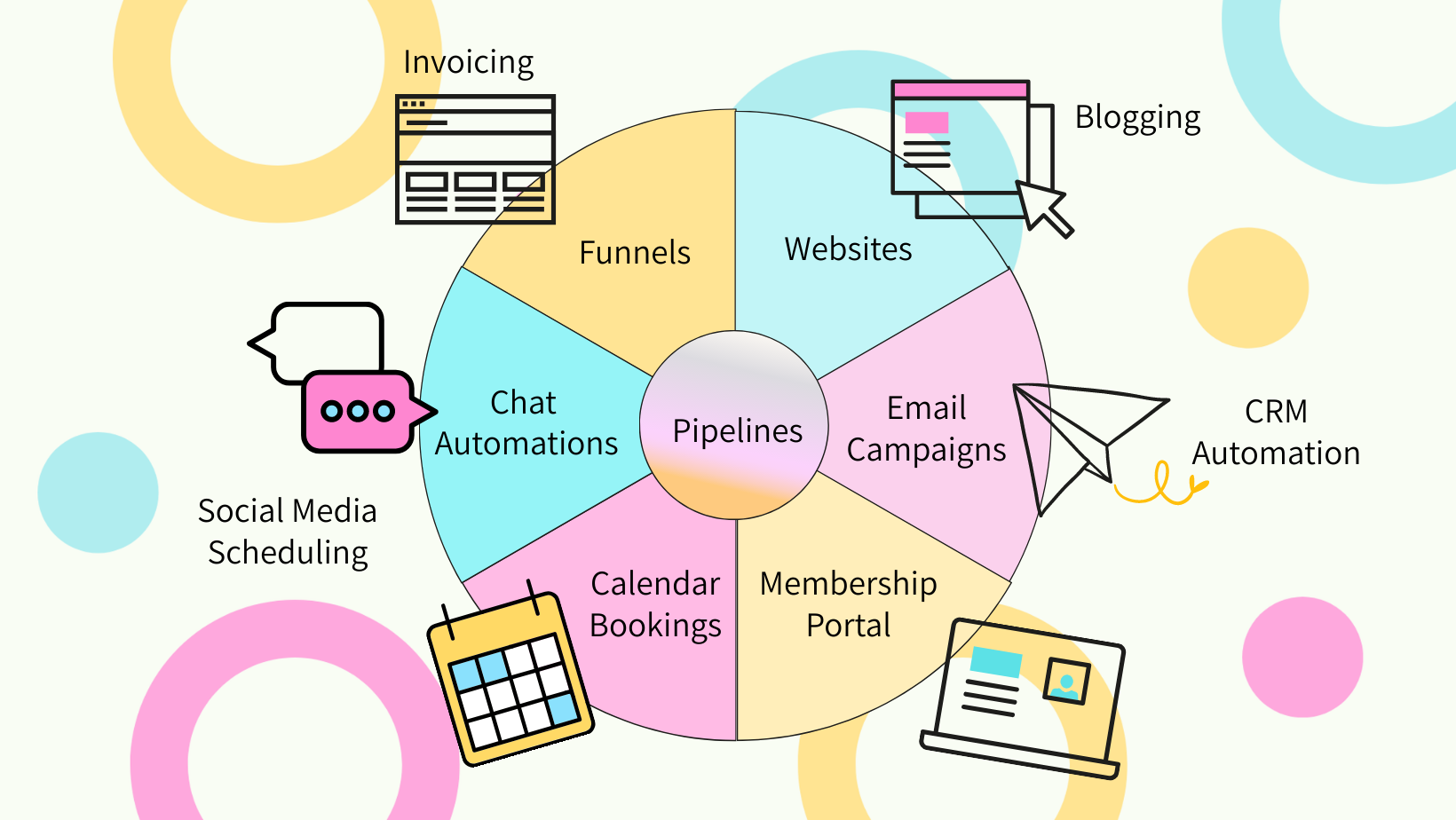Blogs
Lorem ipsum dolor sit amet, consectetur adipiscing elit, sed do eiusmod tempor incididunt ut labore et dolore magna aliqua.

10. What is a CRM, and why should you care?
“If we don't keep our customers happy, somebody else will.” - Bill Gates
As a solopreneur or small business owner, do you think of your CRM as the lifeblood of your business?
Or just as an expensive, bloated software used by larger companies?
Let’s do a quick deep dive into the role of a CRM and what it can actually do for you when implemented correctly.

What is a CRM?
A CRM, or Customer Relationship Management tool, is a software that allows you to track every lead, prospect and client in your business, understand their needs on a deeper, more personal level, and serve and nurture them in ways that are meaningful and relevant to them- reducing the overall churn rate for your business and increasing client retention by giving you a 360° insight into every nook and corner of your business.
Do you really need a CRM if your business is relatively new?
The short answer is yes, but only if you intend to run a serious business.
Let’s take a closer look at why this is.
A CRM allows you to:
✅ Track the entry point of each lead in your pipeline
✅ Track their journey within your sales funnels
✅ Save key data points on everything from their birthday to their biggest pain point
✅ Track order history and invoices
✅ Track current access to products and services
✅ Track their interest in other, or upcoming products and services
✅ Effectively segment your audience
✅ Connect with your audience in a way that feels authentic to your brand
✅ Request and track feedback
✅ Automate nurture campaigns via email, social media and website blog posts, connecting them all together for a seamless user experience (this is often called the marketing module within a CRM)
Without a CRM, you will likely find yourself spending countless hours on tracking and serving your clients, misfiring content, and finding that your results are less than exciting.
A better way to think of your CRM might be to look at it as the ‘brain’ of your business, with each of the channels in your marketing module being your business’ senses- absorbing data and feedback.

Based on this data, you have certain ‘reactions’ from your business which could be sending out or responding to an email, sending a voice drop, creating a new product or service, setting up reminders for your team and/ or customers, or fixing an existing issue (the list of actions is endless, as you can imagine- and is based on the data you collect and process through your various senses).
Fun fact: Your body relies on reflexes to survive most external factors. Automations in your CRM are like the reflexes that you can rely on no matter what external factors your business comes across- leaving you in control of your business outcomes, with the time and sanity to focus on the bigger picture.
Then comes your business’ ‘sixth sense’- which includes the ability of your CRM to predict your consumer’s behaviors in various situations, based on in-built data processing, algorithms, and predictive analytics.
The future of this, as you may have already guessed, is the addition of machine learning and artificial intelligence to replicate the complex brilliance of the functioning of the human body, in your business.
But let’s save that for a future post.
The right time to invest in a CRM
Having talked about what a CRM is and why it is important for just about any serious business, it might be clear already that the right time to invest in one was yesterday.
The next best time is now.
Because business is about people, and serving people without retaining key data points right from the get go isn’t going to result in a very intuitive business model.
You wouldn’t want to call your client John, ‘Sally’- and still expect to get repeat business from him, would you?
While that may be a gross exaggeration, you’d be surprised at how quickly businesses spiral into this sort of icky mess and then find themselves having to backtrack later, doing the research to find the right CRM while fumbling to look for that note they wrote themselves about prospect Jane in their layers of post-it notes stuck all over their desk.
I’ve seen it happen.
And it usually happens first with solopreneurs who say things like, “Oh I’m still looking for my first client, I’ll cross that bridge when I get to it.”
Or, “That sounds like a great problem to have.”
It isn’t.
I promise.
How do I know?
Because I was once one of those solopreneurs myself.
Size matters
Speaking of size, I should clarify that if you’re wondering whether your business needs a CRM at all, size doesn’t matter.
Because every business big or small, requires a CRM if it plans to be around for a while.
But when it comes to making a choice among the hundreds of CRMs available to you, size absolutely matters.
Some of the sizes you’ll want to consider when making this decision are:
💰 the size of your budget,
💰 the size of your team, and
💰 the size of your revenue goals over time.
In other words: your current budget, your team now vs where you see it being at the end of the year, and your revenue goals over the next 1 year, 5 years and 10 years all play a key role in deciding which CRM will suit your business goals the best.
How so?
Let’s look at each of these factors individually.
1.Budget size:
Your budget will determine if your CRM system is composed of various different software that connect your customer relationship management, marketing and sales tools together with an integration tool like Zapier- or if an all-in-one software that encompasses all of these features under one roof without the need for Zapier would be a better fit for your business.
The biggest pro for a multiple-system approach is that if, for some reason, one tool goes out of business, you still have the array of other tools in your toolbox to rely on.
The biggest pro for an all-in-one marketing system on the other hand, is the ease of use- since everything is under one hood and so naturally there is a much shorter learning curve in general.
The biggest cons for a multi-approach model are higher costs and time spent troubleshooting when something doesn’t work as intended- since there are now multiple tools involved, which of course means multiple customer support teams to chase down for an answer.
The biggest con for an all-in-one marketing system brings us full circle to a multi-system approach where an all-in-one system runs the risk of bringing your entire system down if the company goes out of business.
(Note that all-in-one software and feature-specific software alike are all generally hosted on one of the big cloud-based platforms out there such as Amazon’s AWS, Google Compute or Microsoft Azure- so the risk of a software “going down” technically applies equally to all of these different tools across the board- and isn’t much of a factor when choosing between various CRM models.)
2. Team size:
The size of your team will either support or contradict the decision you may have already made when considering your budget above.

If you’re leaning toward a multi-system approach, a dedicated tech/ support team or personnel will be imperative in learning each of the different software being used, making sure that your tools and integrations are continuing to work without bugs, and spending the time to troubleshoot any issues that come up with the various support teams for each tool as required.
On the other hand, a business with a team size of 1–3 people will certainly not have the bandwidth to handle the extensive tech and troubleshooting that comes with a multi-system approach, and would be better suited to an all-in-one solution where there is less tech and time involved.
3. Revenue goals:
Keep in mind that almost any tool on the market has various plans and tier limitations that come with it. So a tool that has a “Freemium” model where their lowest tier is free and helps you get started with little to no budget, may also have more expensive paid tiers that could strain your budget as your business grows.
On the other hand, other tools may not have an immediately attractive free or low-tiered plan, but may grow more cohesively with your business and without straining your budget- with more affordable higher tiered plans in the long term.
These non-freemium models generally get ignored by those launching a brand new business, but are often the key to a more sustainable business in the long run.
Are all-in-one CRMs the clear winner for solopreneurs and small businesses alike, then?

Generally speaking, yes- but not always.
While all-in-one CRMs may come with everything you need to launch and scale your business initially, you might want to consider your long term business and lifestyle goals to make sure that the tool or tools you choose are going to serve you well over time.
Because all CRMs were not created equal.
Even similar-featured, all-in-one options can vary wildly in terms of pricing, customer support and flexibility of integration when it comes to additional tools like ManyChat for automated chat support.
In terms of your business goals, some things that may be an important deciding factor include your audience’s demographics and behavior patterns.
Where do they hang out?
Are they on social media?
Which platforms do they prefer to spend their time on?
Do they tend to check their email often?
What are their preferred communication channels when it comes to conversations with their families, friends and favorite businesses?
All-in-one platform or not, you will want to make sure that the tool you choose will help you connect with your audience based on their specific preferences.
And in terms of your lifestyle goals, consider your personal goals and limitations as well.
Are you single? Married? Have kids that take up a lot of your time?
Do you want to run a business that requires your time every single day- sometimes after hours and on weekends as well?
Or is your goal to build a business that is largely automated so you can have some revenue flowing in without you actually needing to do much?
Or maybe you’re looking for something in between- something that requires your attention part time, possibly for just a few hours a day, and can run smoothly even if you decide to go on a 3 month vacation with little to no wifi available?
While the list of factors to consider can sometimes feel long and endless, these are some of the critical ones that I have come across while helping solopreneurs and small businesses launch their businesses and scale effectively over time.
With all of that being said, I will leave you with this:
The best thing you can do for your business today, is to get out of analysis paralysis mode and make a decision that you can at least live with and course correct later if needed.
It doesn’t have to be perfect- acceptable will do.
The worst thing?
Is to make no decision at all.
Have questions about the right set of tools for your business and budget? I’m here to help! Drop me a line using the chat bubble below and let me know what your business and budget goals are.
Looking for an all-in-one CRM and marketing tool? Click here to check out Buttr CRM, our standalone customer relationship management tool that includes seamless integrations with your website, blog, social media channels, and so much more.

10. What is a CRM, and why should you care?
“If we don't keep our customers happy, somebody else will.” - Bill Gates
As a solopreneur or small business owner, do you think of your CRM as the lifeblood of your business?
Or just as an expensive, bloated software used by larger companies?
Let’s do a quick deep dive into the role of a CRM and what it can actually do for you when implemented correctly.

What is a CRM?
A CRM, or Customer Relationship Management tool, is a software that allows you to track every lead, prospect and client in your business, understand their needs on a deeper, more personal level, and serve and nurture them in ways that are meaningful and relevant to them- reducing the overall churn rate for your business and increasing client retention by giving you a 360° insight into every nook and corner of your business.
Do you really need a CRM if your business is relatively new?
The short answer is yes, but only if you intend to run a serious business.
Let’s take a closer look at why this is.
A CRM allows you to:
✅ Track the entry point of each lead in your pipeline
✅ Track their journey within your sales funnels
✅ Save key data points on everything from their birthday to their biggest pain point
✅ Track order history and invoices
✅ Track current access to products and services
✅ Track their interest in other, or upcoming products and services
✅ Effectively segment your audience
✅ Connect with your audience in a way that feels authentic to your brand
✅ Request and track feedback
✅ Automate nurture campaigns via email, social media and website blog posts, connecting them all together for a seamless user experience (this is often called the marketing module within a CRM)
Without a CRM, you will likely find yourself spending countless hours on tracking and serving your clients, misfiring content, and finding that your results are less than exciting.
A better way to think of your CRM might be to look at it as the ‘brain’ of your business, with each of the channels in your marketing module being your business’ senses- absorbing data and feedback.

Based on this data, you have certain ‘reactions’ from your business which could be sending out or responding to an email, sending a voice drop, creating a new product or service, setting up reminders for your team and/ or customers, or fixing an existing issue (the list of actions is endless, as you can imagine- and is based on the data you collect and process through your various senses).
Fun fact: Your body relies on reflexes to survive most external factors. Automations in your CRM are like the reflexes that you can rely on no matter what external factors your business comes across- leaving you in control of your business outcomes, with the time and sanity to focus on the bigger picture.
Then comes your business’ ‘sixth sense’- which includes the ability of your CRM to predict your consumer’s behaviors in various situations, based on in-built data processing, algorithms, and predictive analytics.
The future of this, as you may have already guessed, is the addition of machine learning and artificial intelligence to replicate the complex brilliance of the functioning of the human body, in your business.
But let’s save that for a future post.
The right time to invest in a CRM
Having talked about what a CRM is and why it is important for just about any serious business, it might be clear already that the right time to invest in one was yesterday.
The next best time is now.
Because business is about people, and serving people without retaining key data points right from the get go isn’t going to result in a very intuitive business model.
You wouldn’t want to call your client John, ‘Sally’- and still expect to get repeat business from him, would you?
While that may be a gross exaggeration, you’d be surprised at how quickly businesses spiral into this sort of icky mess and then find themselves having to backtrack later, doing the research to find the right CRM while fumbling to look for that note they wrote themselves about prospect Jane in their layers of post-it notes stuck all over their desk.
I’ve seen it happen.
And it usually happens first with solopreneurs who say things like, “Oh I’m still looking for my first client, I’ll cross that bridge when I get to it.”
Or, “That sounds like a great problem to have.”
It isn’t.
I promise.
How do I know?
Because I was once one of those solopreneurs myself.
Size matters
Speaking of size, I should clarify that if you’re wondering whether your business needs a CRM at all, size doesn’t matter.
Because every business big or small, requires a CRM if it plans to be around for a while.
But when it comes to making a choice among the hundreds of CRMs available to you, size absolutely matters.
Some of the sizes you’ll want to consider when making this decision are:
💰 the size of your budget,
💰 the size of your team, and
💰 the size of your revenue goals over time.
In other words: your current budget, your team now vs where you see it being at the end of the year, and your revenue goals over the next 1 year, 5 years and 10 years all play a key role in deciding which CRM will suit your business goals the best.
How so?
Let’s look at each of these factors individually.
1.Budget size:
Your budget will determine if your CRM system is composed of various different software that connect your customer relationship management, marketing and sales tools together with an integration tool like Zapier- or if an all-in-one software that encompasses all of these features under one roof without the need for Zapier would be a better fit for your business.
The biggest pro for a multiple-system approach is that if, for some reason, one tool goes out of business, you still have the array of other tools in your toolbox to rely on.
The biggest pro for an all-in-one marketing system on the other hand, is the ease of use- since everything is under one hood and so naturally there is a much shorter learning curve in general.
The biggest cons for a multi-approach model are higher costs and time spent troubleshooting when something doesn’t work as intended- since there are now multiple tools involved, which of course means multiple customer support teams to chase down for an answer.
The biggest con for an all-in-one marketing system brings us full circle to a multi-system approach where an all-in-one system runs the risk of bringing your entire system down if the company goes out of business.
(Note that all-in-one software and feature-specific software alike are all generally hosted on one of the big cloud-based platforms out there such as Amazon’s AWS, Google Compute or Microsoft Azure- so the risk of a software “going down” technically applies equally to all of these different tools across the board- and isn’t much of a factor when choosing between various CRM models.)
2. Team size:
The size of your team will either support or contradict the decision you may have already made when considering your budget above.

If you’re leaning toward a multi-system approach, a dedicated tech/ support team or personnel will be imperative in learning each of the different software being used, making sure that your tools and integrations are continuing to work without bugs, and spending the time to troubleshoot any issues that come up with the various support teams for each tool as required.
On the other hand, a business with a team size of 1–3 people will certainly not have the bandwidth to handle the extensive tech and troubleshooting that comes with a multi-system approach, and would be better suited to an all-in-one solution where there is less tech and time involved.
3. Revenue goals:
Keep in mind that almost any tool on the market has various plans and tier limitations that come with it. So a tool that has a “Freemium” model where their lowest tier is free and helps you get started with little to no budget, may also have more expensive paid tiers that could strain your budget as your business grows.
On the other hand, other tools may not have an immediately attractive free or low-tiered plan, but may grow more cohesively with your business and without straining your budget- with more affordable higher tiered plans in the long term.
These non-freemium models generally get ignored by those launching a brand new business, but are often the key to a more sustainable business in the long run.
Are all-in-one CRMs the clear winner for solopreneurs and small businesses alike, then?

Generally speaking, yes- but not always.
While all-in-one CRMs may come with everything you need to launch and scale your business initially, you might want to consider your long term business and lifestyle goals to make sure that the tool or tools you choose are going to serve you well over time.
Because all CRMs were not created equal.
Even similar-featured, all-in-one options can vary wildly in terms of pricing, customer support and flexibility of integration when it comes to additional tools like ManyChat for automated chat support.
In terms of your business goals, some things that may be an important deciding factor include your audience’s demographics and behavior patterns.
Where do they hang out?
Are they on social media?
Which platforms do they prefer to spend their time on?
Do they tend to check their email often?
What are their preferred communication channels when it comes to conversations with their families, friends and favorite businesses?
All-in-one platform or not, you will want to make sure that the tool you choose will help you connect with your audience based on their specific preferences.
And in terms of your lifestyle goals, consider your personal goals and limitations as well.
Are you single? Married? Have kids that take up a lot of your time?
Do you want to run a business that requires your time every single day- sometimes after hours and on weekends as well?
Or is your goal to build a business that is largely automated so you can have some revenue flowing in without you actually needing to do much?
Or maybe you’re looking for something in between- something that requires your attention part time, possibly for just a few hours a day, and can run smoothly even if you decide to go on a 3 month vacation with little to no wifi available?
While the list of factors to consider can sometimes feel long and endless, these are some of the critical ones that I have come across while helping solopreneurs and small businesses launch their businesses and scale effectively over time.
With all of that being said, I will leave you with this:
The best thing you can do for your business today, is to get out of analysis paralysis mode and make a decision that you can at least live with and course correct later if needed.
It doesn’t have to be perfect- acceptable will do.
The worst thing?
Is to make no decision at all.
Have questions about the right set of tools for your business and budget? I’m here to help! Drop me a line using the chat bubble below and let me know what your business and budget goals are.
Looking for an all-in-one CRM and marketing tool? Click here to check out Buttr CRM, our standalone customer relationship management tool that includes seamless integrations with your website, blog, social media channels, and so much more.



